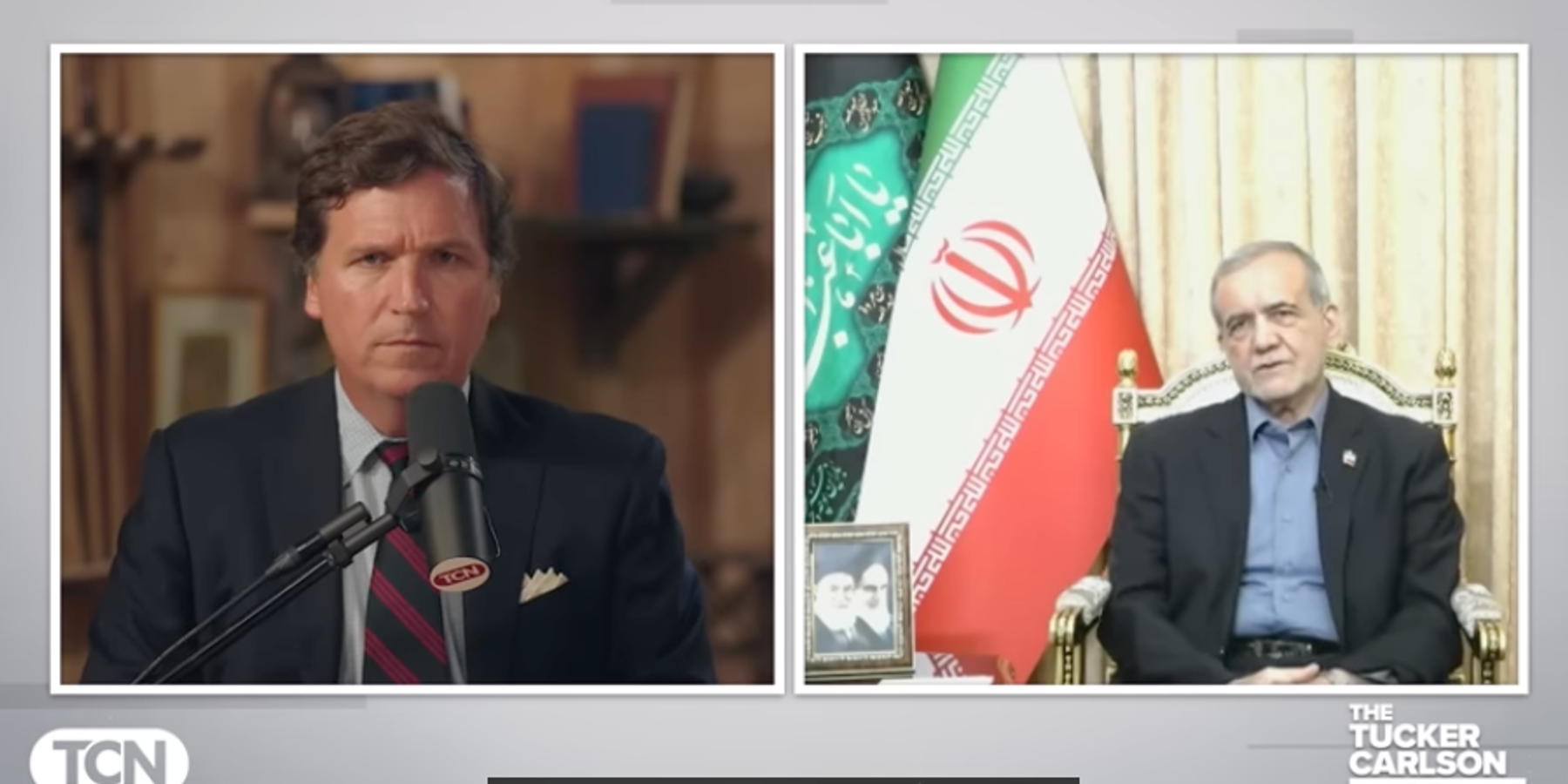Over the Independence Day holiday, Tucker Carlson announced that he had conducted an interview with Iranian President Masoud Pezeshkian.
Dan Crenshaw immediately attacked him. “Nothing screams July 4th like platforming the leader of a terror state that labels us ‘The Great Satan,” the hawkish Republican congressman shared on X. Fellow rightwing hawks and frequent Carlson critics, Senator Ted Cruz and radio host Mark Levin, piled on, admonishing Carlson for daring to do this.
But why wouldn’t an American political pundit or stateside journalist of any kind do this?
That this is “wrong” would have been news to the New York Times when they interviewed the leader of Iran’s Islamic Revolution, Ayatollah Ruhollah Khomeini, in 1979. The MacNeil/Lehrer report also interviewed Khomeini. A number of mainstream American outlets interviewed him. These particular interviews were on the eve of the U.S. hostage crisis that began in early November of 1979. CBS News’ Mike Wallace interviewed Khomeini two weeks after the hostage crisis began. Time magazine also interviewed him during the crisis and declared Khomeini 1980’s "Man of the Year."
That label was not an endorsement of Khomeini. Time called Adolf Hitler “Man of the Year” in 1938. Like with Khomeini, that was not an endorsement of the German dictator. It was recognition of his impact on the world stage at that time. This is why American journalists also interviewed Hitler.
Journalism 101 requires covering and talking to the major players in any given conflict.
During the Obama administration, controversial Iranian President Mahmoud Ahmadinejad was interviewed by the American press on a regular basis. American reporters had interviewed al-Qaeda terrorist leader and eventual 9/11 mastermind Osama Bin Laden. Iraqi dictator Saddam Hussein was interviewed by CBS News maven Dan Rather one month before the 2003 U.S. invasion. Libyan dictator Muammar Gaddafi was interviewed a number of times throughout many American administrations.
Outside the Middle East, entertainment host Ed Sullivan interviewed Cuba’s Fidel Castro on his popular nighttime variety series in 1959. ABC News’ Barbara Walters interviewed him in 1977. The MacNeil/Lehrer News Hour interviewed Castro in 1985. In fact, Cigar Aficionado interviewed the brutal dictator in 1994, in which publisher Marvin Shanken’s first question was “How important are cigars to Cuba?”
That interview might actually sound like “platforming” someone who probably shouldn’t be. That said, the magazine republished the interview in the summer of last year to celebrate its 30th anniversary.
Last June, Carlson interviewed Russian President Vladimir Putin, which was also controversial. Less controversial were the times Barbara Walters interviewed Putin, NBC News interviewed him, CBS News interviewed him, the New York Times interviewed him, and all the American outlets who interviewed different Russian presidents going back to the earliest days of the Cold War.
Why would so many American journalists “platform” so many adversaries of the United States?
Because even framing the question that way is ridiculous. Carlson’s explanation for why he recently interviewed Iran’s president is similar to what any journalist of any generation might say to critics who could question their decision to interview international bad actors.
“We know we’ll be criticized for doing this interview,” Carlson explained in a short video clip to address any such questions, prior to releasing his actual interview. “Why did we do it anyway? Well, we did it because we were just at war with Iran 10 days ago, and maybe again.”
That part is important. It’s as if hawkish figures, like Crenshaw, Cruz, and Levin, who seek war, find it treasonous to let Americans hear all the sides involved. Wars in which American sons and daughters potentially could be asked to risk their lives for.
It’s easier to get to war if fewer questions are asked and only one side can exclusively control the narrative.
Carlson continued, “And so, our view, which has remained consistent over time, is that American citizens have the constitutional right and the God-given right to all the information they can gather about matters that affect them.”
One could imagine Barbara Walters giving a similar answer if challenged for interviewing Castro or Putin. Different words, perhaps, but the same, simple journalistic reasoning.
In the interview, Carlson asks Pezeshkian, among other things, about his country’s seriousness in continuing nuclear negotiations and also why his countrymen chant slogans like ‘Death to America’ and call the U.S. ‘The Great Satan,’ and the Iranian president gives his answers.
Is he serious? Is he lying? Is this a man that can be believed?
That’s not the point. He’s a politician. The same questions might also apply to any American politician. The point is that Americans hear him. “The purpose of the interview was to add to the corpus of knowledge from which Americans can derive their own opinion,” Carlson said. “Learn everything you can, and then you decide.”
Tucker Carlson interviewing Iran’s president isn’t a scandal. It’s basic journalism. More scandalous is how many journalists today no longer feel the need to do it.
















